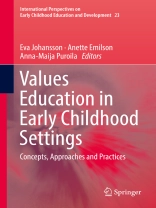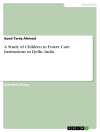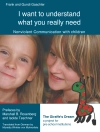This book is about values education in early years settings and discusses theory and concepts, as well as methodological and empirical perspectives. It explores issues such as the kinds of values that are communicated between educators and children and the kind of future citizens we foster in early childhood settings. It illustrates by way of cases involving many participants, including children, educators, and researchers, who have their roots in diverse contexts, and reside in different parts of the world, including Australia, Denmark, Finland, Iceland, Norway, Slovenia, and Sweden. The book carefully considers the contextualized character of the cases presented, yet argues that the questions, theories, and methodologies emphasized do inform the international debate in manifold ways.
Communication of values in a broad and diverse sense is central in any pedagogy, especially for the youngest children in the educational system. Still, values education has been neglected as aresearch field, in education in general and particularly in the early years. This book addresses this lack of knowledge by scrutinizing various questions about values education in ECEC settings.
İçerik tablosu
1. Values in Nordic Preschools–Setting the Scene; Eva Johansson, Anette Emilson and Anna-Maija Puroijla.- PART I: Theory and Concepts .- 2. Mapping the Field: What are Values and Values Education about? ; Eva Johansson, Anette Emilson and Anna-Maija Puroila.- 3. The Heart of Values Education in Early Childhood – Key Issues and Patterns; Eva Johansson.- 4. A Dual Perspective and a Communicative Approach to Values Education in Early; Anette Emilson.- 5. Epistemic Climates for Active Citizenship: Dialogically Organised Classrooms and Children’s Internal Dialogue; Jo Lunn, Sue Walker, Eva Johansson, Laura Scholes and Mary Ryan.- 6. Values Education in Early Childhood Settings: Concepts, approaches and practices; Robi Kroflič and Nada Turnšek.- PART II: Methodological Perspectives .- 7. Challenges and Advantages of Collaborative Action Research in Preschools; Ingibjorg Sigurdardottir and Johanna Einarsdottir.- 8. “Sharing horizons” Methodological and Ethical Reflections on Video Observations; Hrönn Pálmadóttir, Jaana Juutinen and Elina Viljamaa.- 9. Sharing, Re-telling, and Performing Narratives: Challenging and Supporting Educators’ Work with Values in Nordic Preschools; Anna-Maija Puroila and Eva Johansson.- 10. Towards the Fusion of Different Horizons: Methodological Potentials and Challenges when Exploring Values Education in Nordic Preschools; Anna-Maija Puroila and Eva Johansson. PART III: Empirical Perspectives .- 11. Reciprocal Caring in ECEC Settings; Kristin Fugelsnes.- 12. Educare: Practitioners’ Views on Care, Upbringing and Teaching; Anders Skriver Jensen.- 13. Democracy and Care – Values Education in Nordic Preschools; Ole Henrik Hansen, Anders Skriver Jensen and Stig Broström.- 14. Recognizing Children’s Diverse Backgrounds –Democracy and Equality in Preschool; Berit Zachrisen.- 15. ‘There Is No Room for You!’ The Politics of Belonging in Children’s Play Situations; Jaana Juutinen, Anna-Maija Puroila, and Eva Johansson.-16. Tacit Discipline in Early Childhood Education; Anette Emilson.- 17. The Valuable Index Finger: Communicating Democratic Values Through Pointing; Berit Tofteland.- 18. Discourse of Efficiency – Conflicting Values in Educators’ Talk About Everyday Practices in the Cloakroom; Anita Berge, Eva Johansson, Lise-Lotte Bjervås, Ingibjorg Sigurdardottir and Anna-Maija Puroila.












